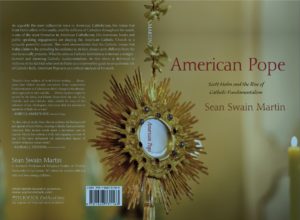By the late 1980’s, Evangelicals and Fundamentalists in this country had cornered the market on the Bible—it was simply assumed by most people that Catholics didn’t really use the Bible. Being a “Bible Christian” meant being a Protestant of some sort. Catholic leaders of the time didn’t help. They were embarrassed to engage in apologetics, and addressing Catholics’ biblical illiteracy was not a priority.
Enter a young dynamic preacher named Scott Hahn, arguing that not only is the Bible consistent with Catholicism, the proper understanding of the Bible leads to Catholicism! It was a providential moment that engendered a wave of conversions and reversions.
I myself was one of those converts. A Catholic friend handed me a tape of The Scott Hahn Conversion Story in 1991 and two years later I was received into the Catholic Church. Yet what is remarkable about my own story is how unremarkable it is. Thousands of former Protestants cite Hahn’s conversion story and subsequent work as instrumental in their conversions, and he has impacted countless cradle Catholics who have reverted to or deepened their faith. It’s likely that no one living has had a greater positive impact on the Catholic Church in America than Scott Hahn.
Orthodox. Faithful. Free.
Sign up to get Crisis articles delivered to your inbox daily
Why? Clearly Hahn’s talent for explaining and defending the Catholic Faith is part of the answer. His ability to relate complex subjects in a way anyone can understand is legendary (I imagine more Catholics today understand what “covenant” means than at any time in Church history). But he also came to public attention at the right time, at a moment when there was a desperate need for Catholics to rediscover the riches of the Sacred Scriptures.
And after 30 years, Hahn is still going strong. He’s written more than 40 books, many journal articles, and gives presentations across the country and around the world. He founded the St. Paul Center for Biblical Theology to further his mission (some would say obsession) of making the Bible accessible to Catholics.
Hahn has also avoided scandal and controversy. He’s a devoted husband, father, and grandfather. He keeps good relations with the hierarchy, and refrains from public criticism of Church leaders. His focus is singular.
Even with just this quick summary of Hahn’s work it becomes clear that only someone very small-minded would see Scott Hahn as a problem. Unfortunately, such a small-minded person exists: Sean Swain Martin, assistant Professor of Religious Studies at Viterbo University in LaCrosse, Wisconsin and author of the recently released American Pope: Scott Hahn and the Rise of Catholic Fundamentalism.
The basic thesis of American Pope is this: Scott Hahn claims the message of the Bible is simple and clear, and that the Bible itself is inerrant; American Fundamentalists make similar claims; therefore, Scott Hahn is an American Fundamentalist disguised as a Catholic. To make the Bible accessible to the masses, as Hahn does, is akin to fundamentalism, according to Martin.
American Pope is based on Martin’s doctoral dissertation, proving no topic is too ridiculous in modern academia. After reading the book, I find it hard to believe such a dissertation could be accepted at any accredited university, since, beyond its ridiculous premise, the book is riddled with errors, both large and small. I couldn’t even get through the introduction without finding grammatical errors; they were laced throughout the book.
But a poor editor doesn’t necessarily make a poor book. No, Martin is able to accomplish that all by himself. Take, for example, this cringe-worthy discussion of Hahn’s use of 1 Peter 3:15 to urge Catholics to engage in apologetics. Martin writes,
First and foremost, there is an interesting exegetical element to Hahn’s employment of 1 Peter 3:15. This passage he renders, “Always be prepared to make a defense to any one who calls you to account for the hope that is in you yet do so with gentleness and reverence.” That same passage, appearing on the USCCB’s copy of the Scriptures, is presented as, “Always be prepared to give an explanation to anyone who asks you for a reason for your hope, but do so with gentleness and reverence.” Granted, the fourth version of the New American Bible Revised Edition was published in 2011, yet the rendering of this verse has not changed from the 1986 edition. Given that the NABRE is employed by the USCCB website and the 1986 NAB by the Vatican website, it is important that we ask why Hahn chose the Revised Standard Version when the NAB would be more familiar to his Catholic faithful readership. It is also unclear as to why he provides no reference to this disparity between the translation he chose and the one utilized by the remainder of the Church.
Where to even begin. Let’s start with the clunky phrase, “the USCCB’s copy of the Scriptures.” Please tell me there isn’t a doctor of theology who thinks the USCCB has a secret copy of the Bible locked away in storage, to which only it has access? (Sounds like a Dan Brown novel.) No one ever refers to a translation of the Bible as some organization’s “copy” of the Scriptures, because that makes no sense.
Further, Martin tries to make it sound ominous that Hahn would choose the RSV rather than the NAB for his translation. Perhaps Hahn chose it due to the fact that the RSV is many scholars’ translation of choice based on its close adherence to the underlying original languages. Or that getting permission to use the RSV in books is far easier than the NAB due to the USCCB’s draconian copyright rules. Or that the NAB is generally considered a dated, pitiful translation that’s only propped up by the fact that the USCCB holds the copyright and forces us to use it in the liturgy (from which it financially benefits). Or that the Bishops of the United Kingdom chose the RSV as the translation used in their liturgies, so it’s not as if the RSV is off-limits to Catholics. And Martin doesn’t even try to engage with the underlying Greek text to see which translation is more accurate (spoiler: the RSV).
American Pope is riddled with these types of pitiful attempts to find something wrong with Hahn’s theology. Where Martin sees some diabolical scheme by Hahn, the rest of us see that Martin doesn’t know what he’s talking about.
I don’t have the space to share all the howlers by which Martin fails to prove his thesis, but let me give another example. Martin critiques Hahn for challenging the Historical-Critical Method used by Bible scholars over the past few hundred years. He says Hahn argues that we should interpret the Scriptures “faithfully,” but “the faithful interpretation of Scripture is somewhat difficult to distill from Hahn’s comments…but he provides hints along the way.”
There’s no way someone could seriously engage with Hahn’s works and come away with the idea that he only provides “hints” of his view of how to properly interpret the Scriptures. Hahn has spent more than three decades writing and teaching about the Bible, including how to faithfully interpret it. His magisterial 600-page book Politicizing the Bible addresses this issue in depth, as does his follow-up book, Modern Biblical Criticism as a Tool of Statecraft and his popular-level The Decline and Fall of Sacred Scripture. If there is one drum Hahn has beat during the last 30+ years, it’s how Catholics should interpret the Bible.
But in American Pope, Martin never once mentions or cites any of these books. He only examines Hahn’s book Covenant and Communion, which is an analysis of Pope Benedict’s biblical theology. Hahn has done far more than just “provide hints along the way,” yet Martin completely ignores that substantial body of work in his effort to tag Hahn as a “fundamentalist.”
There’s also another book Martin fails to mention, for it too would diminish his claims of Hahn’s supposed fundamentalism. That’s the book based on Hahn’s dissertation, Kinship by Covenant: A Canonical Approach to the Fulfillment of God’s Saving Promises. This immense work was published by Yale University Press, which isn’t exactly known as a fundamentalist publishing house. Does anyone really think Yale University would put its name on some simplistic fundamentalist interpretation of the Bible?
Ultimately, Martin confuses Hahn’s Scriptural populism with an embrace of fundamentalism. To Martin, average Catholics reading and interpreting the Bible is a bad thing, or at least a fool’s errand. He writes, “It would be difficult to expect each individual Catholic to be prepared to offer such a careful investigation of the different literary forms employed, cultural influences manifest, etc., in the Scriptures so as to easily move from familiarity to ‘eminent knowability.”
In other words, Martin believes in the “Magisterium of the Theologians”—you simple-minded Catholics can’t be expected to understand the Scriptures without a bunch of PhD’s telling you what to think (unless the PhD happens to be Scott Hahn, of course). The fact that Hahn believes the Bible is for everyone apparently marks him as one of those anti-intellectual fundamentalists.
What Martin misses, whether unintentionally or intentionally, is the breadth of Hahn’s work. Many see him as only a pun-loving writer and speaker. Yet his popular writings and speaking engagements are only one aspect of his massive contributions. Hahn has produced an impressive scholarly corpus, diving into the real work of engaging the Bible at its deepest levels. He doesn’t discount much of modern Biblical scholarship without serious analysis; he studies it and discovers its deficiencies. This is real scholarship, not fundamentalism.
Making the Bible accessible to Catholics can be difficult work, and the fact that Hahn makes it look easy doesn’t mean he’s a fundamentalist—it means he’s talented enough to both understand the complexities of the Scriptures and make them understandable to the non-specialist.
There’s much more that could be critiqued in American Pope, but I’d be remiss if I didn’t note one more feature: the bizarre, even sacrilegious, cover design. The book cover includes a photo of a monstrance (I’m not sure why, unless it is suggesting that Eucharistic adoration is a sign of “fundamentalism”). The Host wraps around the spine of the book; so the title of the book appears on the Host—on Our Lord Jesus Christ. If nothing else, this shows that the people involved with this lamentable work, from the author to the designers to the publisher, do not possess even basic Catholic sensibilities.

The Church faces many problems today, but Scott Hahn is not one of them. Instead, he’s a bright light who has beckoned many to a deeper relationship with Jesus Christ through the study of Sacred Scripture. In the Vatican II document Dei Verbum we read,
The sacred synod also earnestly and especially urges all the Christian faithful…to learn by frequent reading of the divine Scriptures the “excellent knowledge of Jesus Christ” (Phil. 3:8). “For ignorance of the Scriptures is ignorance of Christ.” Therefore, they should gladly put themselves in touch with the sacred text itself, whether it be through the liturgy, rich in the divine word, or through devotional reading, or through instructions suitable for the purpose and other aids which, in our time, with approval and active support of the shepherds of the Church, are commendably spread everywhere. (Dei Verbum 25)
Providing such “aids” has been the life mission of Scott Hahn, and the Church is better off because it.
[Photo Credit: Denver Catholic]
